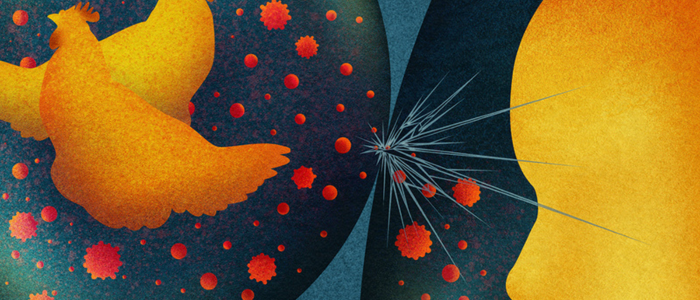The Palmarini Group
Our laboratory focuses on broad questions on virus-host interaction. We are interested in understanding the complex host cell responses to virus infection, and how these processes influence virus pathogenesis and cross-species transmission. Over the years we have worked with a variety of viruses including retroviruses, arboviruses, influenza viruses and SARS-CoV-2. Currently, we focus on two distinct research programmes: (i) virus cross-species transmission and (ii) SARS-CoV-2 virulence. Our laboratory is funded primarily by the MRC and the Wellcome Trust.

Current research
Innate immune barriers and virus cross-species transmission.
The host innate immune system provides an immediate response to virus infections. Viruses and their hosts have engaged in a relentless evolutionary battle for millions of years. As a result, hosts have developed diverse and sophisticated antiviral defences aimed at hampering virus replication, while viruses have evolved equally intricate strategies that allow them to infect and replicate within a host and ensure onward transmission. In most cases, viruses can only infect a limited number of host species. However, most human emerging viruses derive from zoonotic transmission events. The type-I interferon (IFN) response provides an immediate line of defence against virus infection. IFN signalling promotes the expression of hundreds of IFN-stimulated genes (ISGs) in infected and uninfected cells, some of which directly hamper viral replication.
Our laboratory works on the hypothesis that the IFN response constitutes a barrier to viral infections owing to the synergistic action of host-derived antiviral molecules that target various stages of the virus replication cycle. The overarching objective of the programme is to identify and characterise direct antiviral ISGs against major human and animal respiratory viruses. We have an emphasis on avian influenza A viruses (IAV). We aim to identify both host barriers to avian IAV and virus genetic signatures in viruses such as H7N9 and H5N1 that allow zoonotic viruses to spillover in humans.
SARS-CoV-2 variants pathogenesis.
SARS-CoV-2 has evolved throughout the pandemic giving rise to several variants (e.g., Alpha, Delta, Omicron), some of which are defined as “variants of concern” (VOCs) by the WHO. Assessing the virulence of newly emerged variants is a key phenotype requiring early assessment for any newly emerged variant. Omicron/BA.1 is attenuated in comparison to previously emerged variants. However, there are no evolutionary pressures that may keep this attenuated phenotypic trait in newly emerging VOCs.
Throughout the pandemic, small rodents (and hamsters in particular) have been used extensively to assess the virulence of wild type SARS-CoV-2 and emerging VOCs. Hamsters represent an excellent model to dissect SARS-CoV-2 pathogenesis and determine the degree of virulence of newly emerging variants. Our laboratory is interested in dissecting fundamental mechanisms of virus-host interaction in vivo in the infected host. We have developed quantitative and automated “digital pathology” methods to assess both virus replication and host responses directly in infected tissues. Using these methods, we can now assess the molecular determinants of SARS-CoV-2 virulence and the complexity of the host responses in the hamster. This programme is funded by the MRC and the Wellcome Trust.
Recent published studies from the laboratory
- Pinto, R. et al (2023). BTN3A3 evasion promotes the zoonotic potential of influenza A viruses. Nature, Jul;619(7969):338-347. doi: 10.1038/s41586-023-06261-8.
- Meehan G.R et al, (2023). Phenotyping the virulence of SARS-CoV-2 variants in hamsters by digital pathology and machine learning. bioRxiv 08.01.551417; doi:
- Hardy A. et al (2023). Timing and magnitude of the type-I interferon response are determinants of disease tolerance in arbovirus infection. mBio, Jun 27;14(3):e0010123. doi: 10.1128/mbio.00101-23.
Research group members
|
Siddharth Bakshi |
Mohammad Khalid Zakaria |
Wilhelm Furnon |
Vanessa Herder |
|
Georgios Ilia |
Xinyi Huang |
Aislynn Taggart |
Jay Allan |









